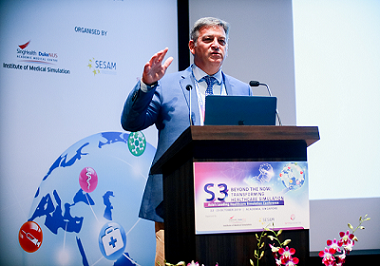Advancing Paediatric Simulation in Medical Education: An evaluation of the impact of a simulation program aimed at teaching low-frequency, high-impact clinical scenarios to undergraduate Third-Year Medical Students during the paediatric clerkship.
Introduction
Simulation-based education (SBE) is increasingly employed in medical curricula to address gaps in clinical exposure, particularly in paediatrics where students may encounter limited opportunities to manage high-acuity, low-frequency cases. At The University of Western Australia, a paediatric simulation program was embedded within the third-year medical clerkship to enhance student preparedness for critical clinical scenarios. This study aimed to evaluate students’ perceptions of the simulation’s impact on their clinical knowledge, decision-making, and relevance to future practice.
Methods
A narrative literature review informed the design of a paediatric simulation program integrated into the standard paediatric clerkship. The program focused on actual low-frequency, high-impact clinical scenarios, including resuscitation-based (sepsis, trauma, asystolic arrest) and communication-based (child protection, ethical dilemmas) simulations. After completing the workshop, students completed a cross-sectional survey using a 5-point Likert scale (strongly agree to strongly disagree) to evaluate perceived improvements in clinical knowledge, decision-making, and relevance to practice. Open-ended feedback was also collected. Quantitative data were analysed descriptively; qualitative data were explored thematically.
Results
Of 145 eligible students, 133 completed the survey (92% response rate). Key findings include:1. Educational Value: 100 students strongly agreed and 33 agreed the simulation provided strong educational value.2. Relevance: All respondents agreed or strongly agreed the sessions were clinically relevant.3. Pitch Level: 95 students strongly agreed and 38 agreed the complexity was appropriate.4. Interactivity: 100 strongly agreed and 33 agreed the sessions were engaging.5. Presentation: 89 strongly agreed, 43 agreed, and 1 was neutral on the delivery and organisation.Thematic analysis indicated increased clinical confidence, contextual understanding, and preparedness for paediatric emergencies.
Discussion
The literature and survey findings highlight the value of simulation in preparing medical students for high-stakes paediatric scenarios. Students reported improved knowledge, clinical reasoning, and readiness for real-world challenges. The immersive nature of simulation was viewed as a key factor in bridging theory and clinical practice. These results support the integration of paediatric simulation into the undergraduate curriculum. Future research should evaluate the longitudinal impact of simulation-based training on clinical effectiveness. Investigating the role of emerging technologies, such as augmented reality and AI, may further enhance the fidelity and educational impact of paediatric simulation.
Keywords:Simulation, Paediatrics, Undergraduate Medical Education, Clinical Decision-Making, Educational Innovation
© 2025 SingHealth Group. All Rights Reserved.














